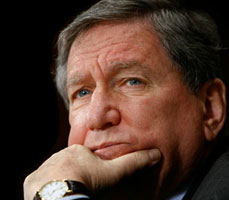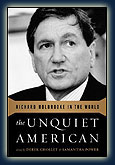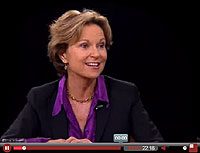|
The Ambassador Richard C. Holbrooke
Distinguished Achievement Award

The Ambassador Richard C. Holbrooke Distinguished Achievement Award was formerly the Lifetime Achievement Award.
Upon the untimely and tragic death of Richard Holbrooke, the board of the Dayton Literary Peace Prize (DLPP) Foundation
determined that renaming the DLPP Lifetime Award for Ambassador Holbrooke was a fitting tribute to the man who made
Dayton synonymous with peace around the globe (see "History of the Dayton Literary Peace Prize").
When Ambassador Holbrooke received the Dayton Peace Prize, the
forerunner of the Dayton Literary Peace Prize, he advised us to pay annual tribute to the peace process and not
let the world forget that peace can be forged with words. The award has been renamed the Dayton Literary Peace
Prize Richard C. Holbrooke Distinguished Achievement Award and will adhere to the same criteria as the DLPP Lifetime
Award. The award has previously honored Studs Terkel (2006), Elie Wiesel (2007), Taylor Branch (2008), Nicholas
Kristof and Sheryl WuDun (2009), and Geraldine Brooks (2010). The prize includes a Michael Bashaw sculpture and
the monetary award of $10,000.
Criteria for the Award:
The Criteria for the Distinguished Achievement Award are the same criteria as those used for the other awards except
the Richard C. Holbrooke Award for Distinguished Achievement will be looking for writers with a body of work rather
than a single book that meets the criteria.
Dayton Literary Peace Prize
Award and Criteria
The goal of the Dayton Literary Peace Prize is to advance peace through literature. It is the first and only annual
U.S. literary award recognizing the power of the written word to promote peace. The winning writer�s works have led
readers to a better understanding of other cultures, peoples, religions, and political points of view.
Award criteria for both fiction and nonfiction nominations:
- Nominated works must focus on a central message of peace, broadly defined as increasing understanding between and among people. Peace may be addressed on the individual level, within and between families, communities, nations, ethnic groups, cultures and religions
- Nominated works might include issues of human rights�universal rights that should apply to
everyone�but must focus on peace. The prize is designed for works that characterize peace as
- ending or seeking to end conflict�personal, national or international
- establishing concord between and among people
- showing the consequences of persons, nations or institutions that recklessly disrupt personal harmony or universal accord.
- Nominated works must have significant and enduring literary value
- Nominated works must appeal to a variety of audiences
- Nominated works must be in English or have been translated into English.
Members of the committee:
- Kati Marton, Honorary Chair
- Bob Taft, Governor of Ohio 1999-2007, Chair
- Sharon Rab, Founder and Co-chair, DLPP
- Mark Meister, President and CEO of Dayton Natural History and Co-chair, DLPP
- Jeff Bruce, Writer, Former Editor of the Dayton Daily News
- Brian Coniff, Dean of Arts and Science at University of Scranton
- Bob Fogarty, Writer, Editor of the Antioch Review
- Geeta Kothari, Writer, Fiction Editor of the Kenyon Review
- Carol Loranger, English Department Chair, Wright State University
- Vick Mickunas, Book Reviewer
- Sharon Kelly Roth, Director of Public Relations, books&co
- John Sebaly, Attorney and independent bookstore owner
- Andrew Slade, Associate Professor of English, UD
- Winona Wendth, Writer, Associate Professor of English, Atlantic Union College, MA
- Nancy Zafris, Writer, Editor of the Flannery O�Conner Award
Nominations come from the following sources:
The panel members
The Nominating Academy, which is made up of former winners and former judges, independent bookstore owners, magazine and book editors.
The University Consortium, which is made up of professors and librarians from the participating universities.
 More Information on Richard Holbrooke
More Information on Richard Holbrooke
We invite you to follow these links to learn more about Richard Holbrooke. Holbrooke's wife, Kati Marton, wrote
two articles for the New York Times in a series called "Remembering Richard Holbrooke, Parts 1 and 2."
- Waging Peace with Justice (April 18, 2011)
- The Weapons of Diplomacy, and the Human Factor (April 20, 2011)
Here is a review of The Unquiet American: Richard Holbrooke in the World by Derek Chollet & Samantha Power.
The review was written by Michael Getler for the Washington Post and published on November 11, 2011.
Video Discussions

-
On Tuesday, January 3, 2012, Charlie Rose moderated a panel discussion about Richard Holbrooke with
George Packer, Gordon Goldstein, David Rohde and Holbrooke's widow Kati Marton. Click on this link to
see a video of that discussion.
- On Sunday, February 5, 2012, CSPAN-2 broadcast a program in which Kati Marton and Strobe Talbott talked
about the life and career of Richard Holbrooke. Strobe Talbott is a former reporter and editor for Time
magazine, served as Deputy Secretary of State during the Clinton administration. At the time of this
program he was president of the Brookings Institution. Mr. Talbott's books include The Great Experiment,
Engaging India, and The Russia Hand. The program was hosted by Politics and Prose Bookstore
in Washington, DC.
Watch
This Program
|